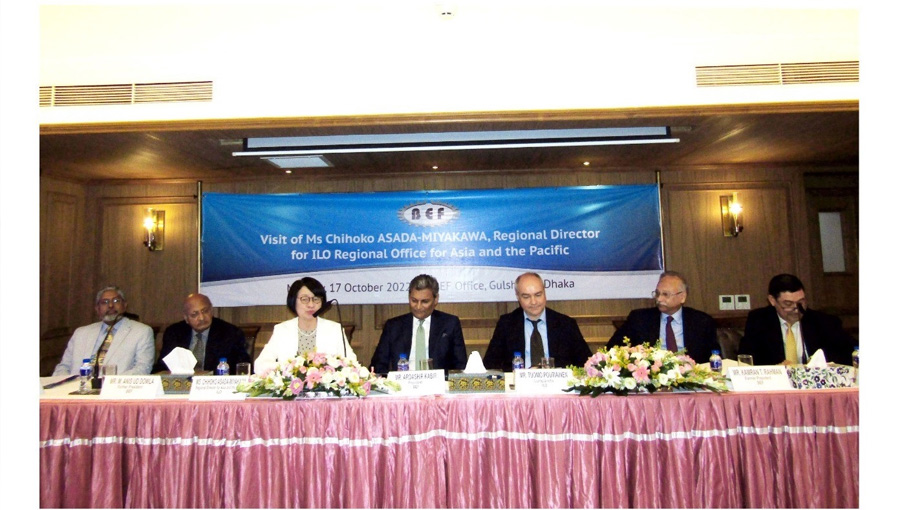ILO praises Bangladesh’s economic transformation

ILO's Assistant Director-General and Regional Director for Asia and the Pacific Chihoko Asada Miyakawa said Bangladesh has made impressive progress in its economic transformation away from least developed country status and will do no doubt to make progress in its socioeconomic growth with confidence.
“It is with pride that I highlight the significant progress Bangladesh has made on workplace and industrial safety particularly in the readymade garment industry,” she said while speaking at a national seminar on "Fundamental principles and rights at work: Bangladesh's 50-years journey with the ILO" at the Foreign Service Academy in the capital on Wednesday.
The country is also recovering from the devastating and far-reaching impact of the global pandemic, she said, adding that ILO will also continue to support Bangladesh’s vision reflected in various policies to ensure that women and men migrants from Bangladesh have inclusive and equitable access to descent and productive jobs abroad and their rights are better protected during migration and on their return.
While speaking as the chief guest, Foreign minister Dr AK Abdul Momen urged ILO to assist Bangladesh with support of capability building as well as financing to improve further labour rights rather using workers issues for any political interest.
“Please don’t use labour weakness, if there be any, as a tool to achieve political gains, rather try to help and assist to overcome those weaknesses with generous support and financing,” he said.
Momen said there is an ILO’s tendency to carry out tasks through its own personnel which often fails to leave a sustainable impact on the national and local institutions.
“We wish to see ILO as a partner in capacity building and not to overlook local realities,” he said, adding that Bangladesh expects that its relevant international partners including ILO would acknowledge the value of local level knowledge and insights without taking a one-sided prescriptive approach that one model fits all.
Without referring to Rana plaza incident, the foreign minister said that Bangladesh like many other developed countries had experienced some gravely tragic incidents in their labour sector, even till recently.
“We would urge ILO to join us in such forward-looking efforts without dragging us into the unfortunate past that otherwise only helps serve some vested national and international interest and agenda,” said the minister.
Speakers pointed out that Bangladesh as one of the only two countries in South Asia, alongside Sri Lanka, to ratify eight out of ten fundamental Conventions and the Forced Labour Protocol.
They also highlighted that Bangladesh is already in compliance with most provisions under the Conventions, revealed by a recent rapid assessment of these Conventions, compared with national laws and practices.
They focused on many of Bangladesh's government's ratifications, most notably the ratification of the Minimum Age Convention, No. 138 and the Protocol of 2014 to the Forced Labour Convention, executed this year.
ILO depicts the hopes of Bangladesh becoming the very first country in South Asia to ratify all ten ILO fundamental Conventions.
It also spotlights how the Bangladesh's Government has already ratified fundamental Governance Conventions like the Labour Inspection Convention No. 81 and the Tripartite Consultation Convention No. 144.
The Government is committed under the National Action Plan on the Labour Sector and the Road map of actions to address all the outstanding issues mentioned in the Article 26 complaint.
ILO has shown interest in further assistance in this area and called for support from the private sector representatives to join the fight against forced labour to minimise the reputational and business risks, which is especially important in view of the trend towards legislation which prohibits importation of products made by forced labour.
It encouraged Bangladesh's Government as it recognises indigenous and tribal people in its Constitution and has ratified the Indigenous and Tribal Populations Convention No. 107.
The nation has also been committed to the recommendation of the Universal Periodical Review report to consider ratifying the up-to-date Indigenous and Tribal Peoples Convention No. 169.
ILO has promised technical assistance to the Bangladesh Government and support to encourage the necessary resource allocations for social protection. This ultimately will translate into human capital development and enhanced national productivity.
It also spotlighted one of the most important areas of joint work, which has been the modernisation of the Technical and Vocational Education and Training or TVET and skills development and systems in Bangladesh.
ILO mentioned how it has supported a systemic approach to skills governance through the National qualification systems and institutional capacity building to promote market-driven skills development and lifelong learning.
It expressed its commitment to continue this partnership with the Bangladesh Government and social partners with the National Action Plan on the Labour Sector and the Roadmap as their compass striving to reach common goals through dialogue and discussion.
Mohammed Ehsan E Elahi, Secretary, Ministry of Labour and Employment, and Mohammed Moinul Kabir, Secretary, Legislative and Parliamentary Affairs Division, attended the seminar as special guests.





